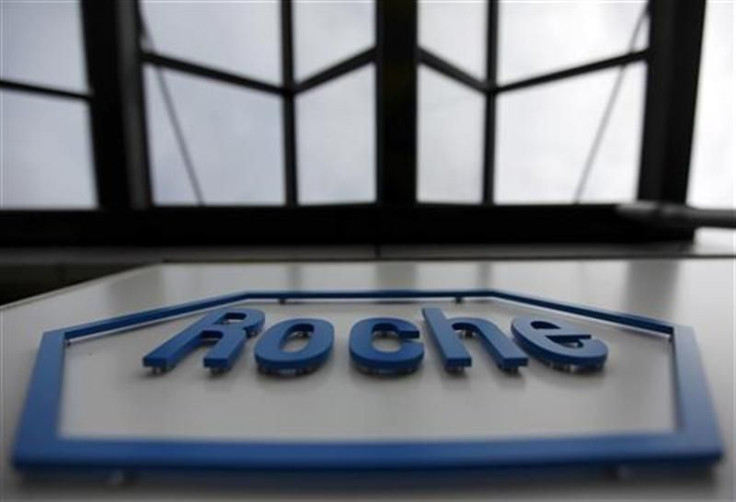Will Genentech's Perjeta Be The Next Blockbuster For Roche?

Combatants on the front lines in the war on cancer have a new weapon in the arsenal, as the U.S. Food and Drug Administration on Friday OK'd Perjeta -- flanked by Herceptin and docetaxel -- for deployment in a three-pronged attack on the enemy cells in people with HER2-positive metastatic breast cancer who have not previously received either anti-HER2 therapy or chemotherapy for metastatic disease.
Perjeta (pertuzumab) and Herceptin (trastuzumab) are believed to be complementary because they target different regions on the human epidermal growth factor receptor 2, or HER2, according to Genentech Inc., the Roche (OTC: RHHBY) unit that markets both monoclonal antibodies.
Docetaxel is the generic equivalent of Taxotere, a brand-name chemotherapeutic drug marketed by Sanofi (NYSE: SNY) whose U.S. patent for the compound expired in November 2010.
Analysts polled by Thomson Reuters estimated Perjeta's annual average sales may rise to $608 million by 2016, although some of them forecast its yearly sales could eventually soar above $1 billion, Reuters reported. The $1 billion mark is considered by many to be the dividing line between blockbusters and nonblockbusters in the biotechnology/pharmaceutical industries.
Herceptin is already a blockbuster for Genentech, as it contributed about 5.25 billion Swiss francs ($5.60 billion, at the CHF/USD exchange rate of $1.0655 on Dec. 31) to Roche's top line last year.
The FDA's approval of Perjeta should help salve the wound suffered by Genentech and Roche last November when agency Commissioner Margaret Hamburg revoked its accelerated approval of the breast-cancer indication for Avastin.
The FDA considered the Perjeta application under its priority-review program, which provides for an expedited six-month review of substances that may offer major advances in treatment.
The agency's approval of Perjeta was conditioned on Genentech's agreement to post-marketing commitments related to the manufacturing process for the product. These include its review of data based on the next several batches produced by the company.
Genentech said Perjeta will be available to people in the U.S. within two weeks of its approval by the FDA (i.e., by June 22). However, Patrick Y. Yang, head of the company's pharma global technical operations, noted in its announcement of the FDA action: We recently identified a cell growth issue that might affect our future supply of the medicine. We take this very seriously and are working with the FDA to ensure a consistent manufacturing process that maintains drug supply for the people who need it.
The Three-Pronged Attack
[The] approval of Perjeta is an important advance in the treatment of HER2-positive metastatic breast cancer, Dr. Hal Barron, Genentech's chief medical officer and head of its global product development, said in a statement. Perjeta attacks HER2-positive tumors differently than Herceptin. Based on the way the two medicines work together, the combination plus chemotherapy can prolong the time before this aggressive cancer worsens compared to Herceptin and chemotherapy alone.
Indeed, the FDA's approval of Perjeta in the combination treatment was based on results of CLEOPATRA (CLinical Evaluation Of Pertuzumab And TRAstuzumab), a double-blind, placebo-controlled, randomized, Phase 3 clinical trial that was designed to measure the length of time a patient lived without the cancer progressing, which is a metric known as progression-free survival, or PFS.
In the CLEOPATRA clinical trial, 808 patients with HER2-positive metastatic breast cancer were randomly assigned to receive either Perjeta, Herceptin, and docetaxel on the one hand or Herceptin, docetaxel, and a placebo on the other hand. Those treated with the former combination had a median PFS of 18.5 months, while those treated with the latter combination had a median PFS of 12.4 months.
This 6.1-month difference in median PFS may appear to be comparatively small, but it is actually relatively large -- not only because HER2-positive tumors are highly aggressive, fast-growing, and associated with a high risk of recurrence but also because many people conflate the denotations of median and mean in their consideration of descriptive statistics. The two terms are quite different things.
Breast Cancer: By The Numbers
Breast cancer is second only to lung cancer as a cause of cancer-related death in U.S. women, and it is deadly in U.S. men, too, according to the National Cancer Institute. However, the number of cases in women is large, and the number of cases in men is small.
In fact, the FDA reported that this year alone an estimated 226,870 women will be diagnosed with breast cancer, and an estimated 39,510 will die due to the disease. And, the FDA said, about 20 percent of breast cancers are associated with elevated levels of the HER2 protein.
One back-of-the-envelope extrapolation of these FDA figures indicates an annual average of 45,374 U.S. women may become potential candidates -- at one point or another in their lives -- for the new combination treatment OK'd by the FDA on Friday.
Of course, the actual number of women availing themselves of the new combination treatment may be constrained by the significant side effects associated with each of its three components, among other factors.
In the case of Perjeta, one of these significant side effects is covered in a boxed warning on its label about embryo-fetal toxicity that reads, in part: Exposure to Perjeta can result in embryo-fetal death and birth defects. Studies in animals have resulted in oligohydramnios, delayed renal development, and death.
Genentech is based in South San Francisco, Calif., and its parent Roche is headquartered in Basel, Switzerland.
© Copyright IBTimes 2024. All rights reserved.






















